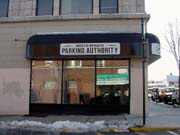North Bergen’s long-awaited resident parking permit program has finally begun. Last week, the township’s Parking Authority began to issue warning summonses to vehicle owners who were parked in excess of five hours in the township’s two designated areas.
The areas subject to the parking program are the Woodcliff section of town, at the northern end of North Hudson Braddock Park, and 71st through 79th streets from Bergenline Avenue east and including Boulevard East.
According to Parking Authority Executive Director Joseph Muniz, nearly 2,000 vehicle owners have officially registered their vehicles and received a permit to park in the designated areas during the day.
The parking permit decals cost $5 each. Those without the decal are subject to receive a summons and a fine of $15. For those who do not live in the area but work there, business parking permits are available at higher rates. For now, only warning summonses have been issued, but beginning March 1, the summonses and the fines are for real.
The purpose of the program is to keep out-of-town drivers from using the town as park-and-ride lot to get to New York, and also to help the Parking Authority become financially self-supporting.
Many more must register
“We’re basically giving people ample notice, but beginning March 1, it will be enforced,” Muniz said. “We sent out a mailing of 10,000 post cards, informing residents that they had to come in to have their vehicles registered and to receive the decals.”
During the first month of the registration, only 900 vehicles were registered. But as soon as the warning summonses were in place, not to mention the approximately 400 street signs proclaiming the new parking laws, the Parking Authority had to offer extended hours and weekend hours.
The extra hours enabled the authority to meet the heavy demand of motorists wishing to register their vehicles. According to parking consultants Bier Associates of New Brunswick, which conducted an in-depth study about the parking trends in the area, there are approximately 4,500 households in the designated areas.
Muniz figured that if 2,500 vehicle owners came to get their registration decals, then half of the area would be registered. That was the authority’s target number to have registered before the first summons was issued, so the authority’s projection total fell a little short.
“We had late-night registration and Saturday mornings,” Muniz said. “We’ve been getting responses from residents who were not aware of the changes. This was our way of notifying the residents to have their cars registered as quickly as possible. That’s why we offered the extra hours.”
Muniz said that signs have been posted “on practically every post imaginable” throughout the two designated areas.
“We wanted to make sure that no one could misconstrue the program,” Muniz said. “I have to credit [Parks Commissioner] Jim Wiley and his staff for hanging the signs in a very timely manner. It wasn’t easy, because the signs all had to go up at the same time, so we had a short time frame to put up the signs.”
The Resident Permit Parking (RPP) program was instituted to cut down on the number of out-of-town commuters that were driving into North Bergen, parking their cars on the side streets, then taking some sort of public transportation into Manhattan for work.
“We wanted to insure that residents would have places to park,” Muniz said. “We did not want people to look at the area as a park-and-ride. The permits are very inexpensive and the goal was not to make money, but to protect the parking for the residents of North Bergen. If every resident registers his vehicle, then no residents will receive summonses.”
If a non-resident works in the area, he or she can purchase a permit for a $20 monthly fee. If they are residents who live elsewhere in the township but work in the designated areas, then they can buy a two-year permit for $10.
Muniz said that the Parking Authority will receive a report from Bier Associates after six months to see if the RPP program is working.
“We’ll sit down at that time and see if the RPP has been positive or negative,” Muniz said. “If things are working, then we may expand the program.”
Muniz said that the RPP will help the Parking Authority to reach its goal, which is to become a self-sustained autonomous body, not receiving any revenues from the township.
“This year’s Parking Authority budget calls for no revenues from the town,” Muniz said.
